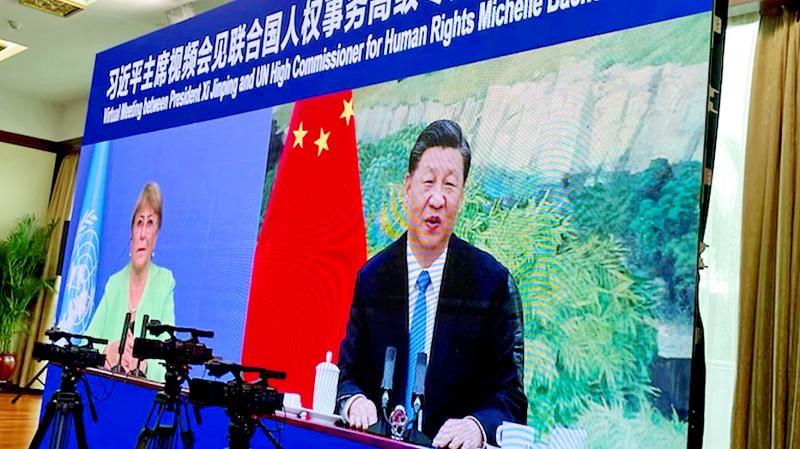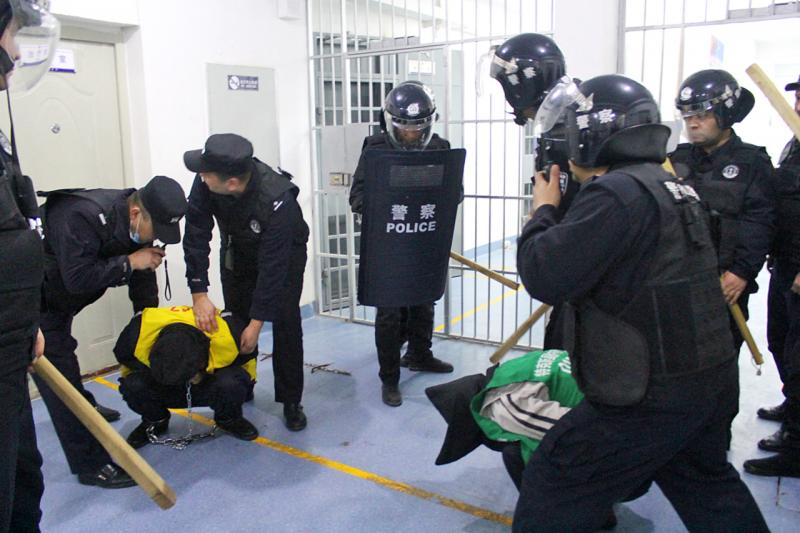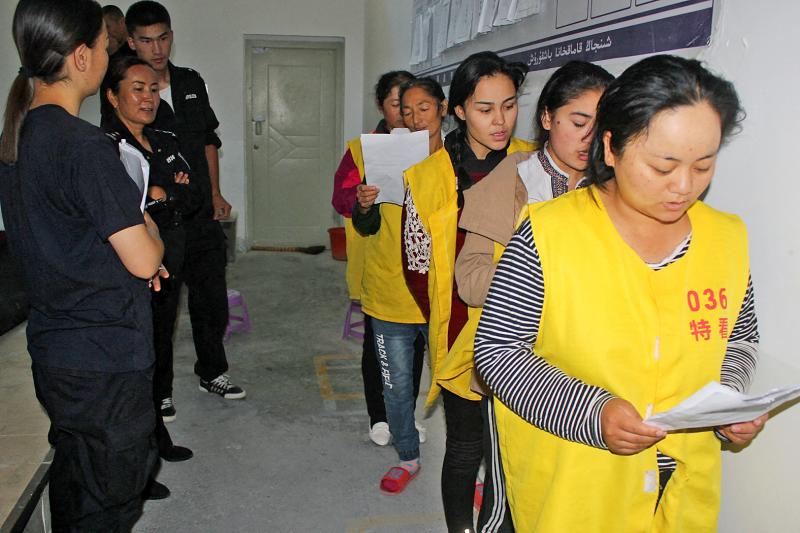Chinese President Xi Jinping (習近平) yesterday held a videoconference with UN High Commissioner for Human Rights Michelle Bachelet as she visited Xinjiang during a mission overshadowed by fresh allegations of Uighur abuses and fears she is being used as a public relations tool.
The Chinese Communist Party (CCP) has been accused of detaining more than 1 million Uighurs and other Muslim minorities in the region as part of a years-long crackdown the US and lawmakers in other Western nations have labeled a “genocide.”
China denies the allegations.

Photo: EPA-EFE
Bachelet was expected to visit the cities of Urumqi and Kashgar on a six-day tour.
The US has reiterated its view that Bachelet’s visit was a mistake after the release of thousands of leaked documents and photographs from inside the system of mass incarceration this week.
Rights advocates have voiced concern that Beijing would prevent Bachelet from conducting a thorough probe into alleged rights abuses and instead give her a stage-managed tour, but Xi defended his nation’s human rights progress during the videoconference, according to a readout from state broadcaster China Central Television (CCTV), which did not say whether Xinjiang was mentioned by either side.

Photo: AFP
“Human rights issues should also not be politicized, instrumentalized or treated with double standards,” CCTV quoted Xi as saying.
China has “a human rights development path that ... suits its national conditions,” he added.
CCTV reported Xi as telling Bachelet that there is no “ideal nation” on human rights.

Photo: AFP
He added that there is “no need for a ‘teacher’ who is bossy towards other countries” — an apparent reference to public criticisms of the trip by US and British officials.
According to the CCTV readout, Bachelet said the UN Human Rights Office is “willing to strengthen cooperation with the Chinese side.”
She was also reported to have said: “I admire China’s efforts and achievements in eradicating poverty, protecting human rights, and realizing economic and social development.”
In addition to mass detentions, Chinese authorities have waged a campaign of forced labor, coerced sterilization and the destruction of Uighur cultural heritage in Xinjiang, researchers and campaigners say.
As Bachelet started the trip, a leak of thousands of photos and official documents from Xinjiang claimed to shed new light on the violent methods used to enforce mass internment in the region.
Reported by a consortium of media, including the BBC and Le Monde, the Xinjiang Police Files showed top leaders in Beijing, including Xi, calling for a forceful crackdown.
The files, leaked by an anonymous source to German anthropologist Adrian Zenz, also included a 2017 internal speech by Chen Quanguo (陳全國), a former CCP secretary in Xinjiang, in which he allegedly orders guards to shoot to kill anyone who tries to escape.
US Department of State spokesman Ned Price on Tuesday said that the US was “appalled” by the latest allegations.
Britain and Germany also voiced outrage, with British Secretary of State for Foreign, Commonwealth and Development Affairs Liz Truss calling for China to grant Bachelet “full and unfettered access to the region,” while her German counterpart urged a “transparent investigation.”
Overseas Uighurs have staged rallies pressing Bachelet to visit relatives believed to be detained in Xinjiang.
“The UN High Commissioner on Human Rights should not look away,” Human Rights Watch senior China researcher Maya Wang (王松蓮) said. “She should also demand information about the detainees from the Chinese government, have her office develop a database of all those arbitrarily detained and imprisoned, and urgently work to secure their release.”
Bachelet’s office has said she would meet with civil society organizations, business representatives and academics, and has given assurances over her access to detention centers in calls with diplomatic sources this week.

CHAOS: Iranians took to the streets playing celebratory music after reports of Khamenei’s death on Saturday, while mourners also gathered in Tehran yesterday Iranian Supreme Leader Ayatollah Ali Khamenei was killed in a major attack on Iran launched by Israel and the US, throwing the future of the Islamic republic into doubt and raising the risk of regional instability. Iranian state television and the state-run IRNA news agency announced the 86-year-old’s death early yesterday. US President Donald Trump said it gave Iranians their “greatest chance” to “take back” their country. The announcements came after a joint US and Israeli aerial bombardment that targeted Iranian military and governmental sites. Trump said the “heavy and pinpoint bombing” would continue through the week or as long

TRUST: The KMT said it respected the US’ timing and considerations, and hoped it would continue to honor its commitments to helping Taiwan bolster its defenses and deterrence US President Donald Trump is delaying a multibillion-dollar arms sale to Taiwan to ensure his visit to Beijing is successful, a New York Times report said. The weapons sales package has stalled in the US Department of State, the report said, citing US officials it did not identify. The White House has told agencies not to push forward ahead of Trump’s meeting with Chinese President Xi Jinping (習近平), it said. The two last month held a phone call to discuss trade and geopolitical flashpoints ahead of the summit. Xi raised the Taiwan issue and urged the US to handle arms sales to

A magnitude 5.6 earthquake struck off the coast of Yilan County at 12:37pm today, with clear shaking felt across much of northern Taiwan. There were no immediate reports of damage. The epicenter of the quake was 16.9km east-southeast of Yilan County Hall offshore at a depth of 66.8km, Central Weather Administration (CWA) data showed. The maximum intensity registered at a 4 in Yilan County’s Nanao Township (南澳) on Taiwan’s seven-tier scale. Other parts of Yilan, as well as certain areas of Hualien County, Taipei, New Taipei City, Taoyuan, Hsinchu County, Taichung and Miaoli County, recorded intensities of 3. Residents of Yilan County and Taipei received

Taiwan has secured another breakthrough in fruit exports, with jujubes, dragon fruit and lychees approved for shipment to the EU, the Ministry of Agriculture said yesterday. The Animal and Plant Health Inspection Agency on Thursday received formal notification of the approval from the EU, the ministry said, adding that the decision was expected to expand Taiwanese fruit producers’ access to high-end European markets. Taiwan exported 126 tonnes of lychees last year, valued at US$1.48 million, with Japan accounting for 102 tonnes. Other export destinations included New Zealand, Hong Kong, the US and Australia, ministry data showed. Jujube exports totaled 103 tonnes, valued at